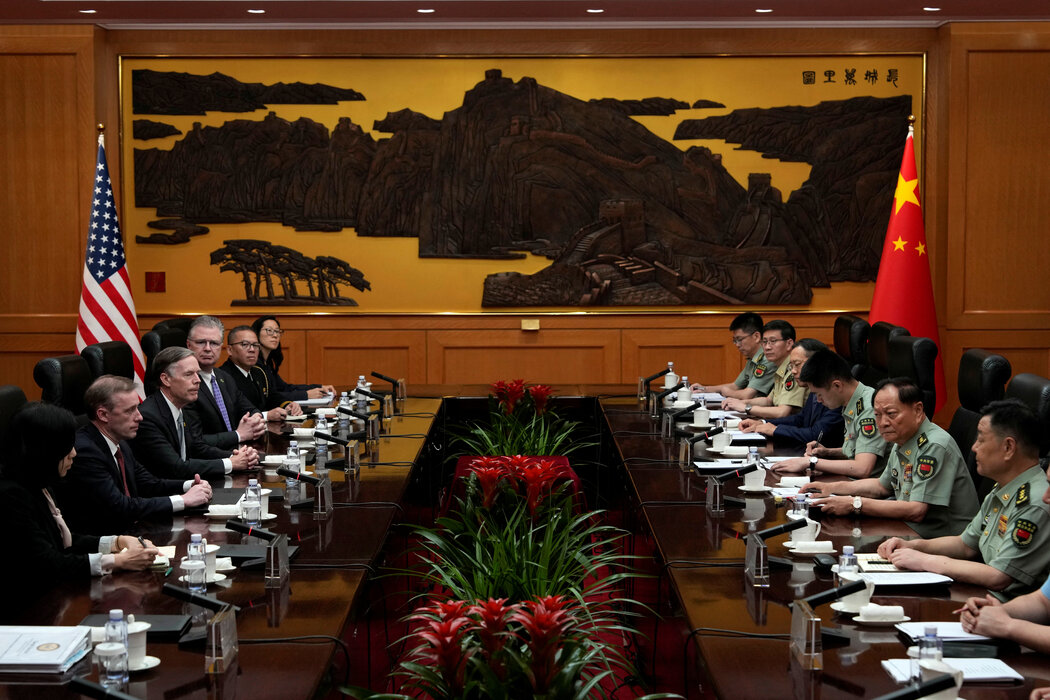美国总统国家安全事务助理沙利文周四与中国国家主席习近平会面,并与中国军方高级官员张又侠举行了罕见的会晤。这是两国在南中国海和台湾问题引发的紧张局势下,仍保持高层沟通的象征。沙利文与张又侠的会晤是美国高级官员与中共中央军事委员会副主席多年来的首次会晤,被视为中美关系中重要的政治指标。双方在会谈中表达了希望通过沟通降低风险、避免冲突的愿望,但也坦承在许多战略问题上存在根本分歧。美国政府希望通过这种对话机制,避免在台海和南中国海等存在争议的水域发生意外事件,并降低美中军事冲突的可能性。
Original Title: Sullivan Meets With Xi and Zhang, Seeking to Keep Military Lines Open
Summary: Jake Sullivan, the national security adviser to President Biden, met with President Xi Jinping of China on Thursday and held a rare meeting with a top Chinese military official, signaling that the two countries are continuing high-level communication despite tensions over the South China Sea and Taiwan. Mr. Sullivan’s meeting with Gen. Zhang Youxia, the vice chairman of the Central Military Commission that oversees China’s armed forces, was the first such encounter between a senior U.S. official and a top Chinese military leader in years. The last such meeting occurred in 2018, between then-Defense Secretary Jim Mattis and then-Gen. Xu Qiliang, the vice chairman. It was the latest effort by the two countries to maintain lines of communication as their disputes over national security, trade and geopolitics intensify. The United States has argued for more open military communication to help prevent accidents between the two countries’ jets and naval vessels as they routinely patrol disputed waters like the Taiwan Strait and the South China Sea. “The meeting with Zhang Youxia is a very significant development, suggesting that China is ready to re-engage in meaningful contacts with the U.S. Defense Department,” said Drew Thompson, a senior visiting fellow at the Lee Kuan Yew School of Public Policy at the National University of Singapore. “The Chinese government views bilateral military relations as an important political indicator of the overall relationship, which is different from the U.S. view, which sees it as a more pragmatic risk-reduction channel.” Mr. Sullivan’s meeting with General Zhang took place at the headquarters of the People’s Liberation Army, on the last day of a three-day trip to Beijing aimed at advancing the Biden administration’s efforts to manage competition with China. China and the United States have been vying for global influence, and tensions have escalated over a range of issues, including China’s territorial claims in the South China Sea, its tacit support for Russia’s war in Ukraine, and the flood of Chinese electric vehicles and solar panels into global markets. “We believe that competition with China doesn’t have to lead to conflict and confrontation, and the key is to manage it responsibly through diplomacy,” Mr. Sullivan said at a news conference after meeting with Mr. Xi. While the visit was an opportunity for the two countries to show they were working to mitigate the risk of conflict and assuage global concerns, it underscored the fundamental differences between the two on many strategic issues. China has rejected the Biden administration’s characterization of the relationship as competition, and Mr. Xi underlined that stance in his opening remarks during a readout of the meeting. “The first thing we need to answer is the question of whether China and the U.S. are rivals or partners,” Mr. Xi said to Mr. Sullivan. Mr. Xi said that China’s “strategic intentions are clear and transparent,” that China is committed to “peaceful development” and that he hopes the United States and China can work together to find “the right way to get along.” Mr. Sullivan told reporters that priorities for the Biden administration in its final months include deepening communication between the two militaries and increasing cooperation on addressing the U.S. fentanyl crisis. He also elaborated on discussions about a possible follow-up meeting between Mr. Biden and Mr. Xi, noting that both leaders may be in attendance at the Asia-Pacific Economic Cooperation summit in Peru in mid-November and the Group of 20 leaders’ summit in Brazil. “It would be a natural opportunity for them to sit down and talk,” Mr. Sullivan said. Mr. Sullivan also briefly addressed Vice President Kamala Harris, the Democratic presidential nominee, and her views on China. “She shares a common view with President Biden that managing this competition responsibly, not allowing it to turn into conflict or confrontation, is critically important,” Mr. Sullivan told reporters, noting that Ms. Harris has met with Mr. Xi and Premier Li Keqiang, China’s No. 2 official. Earlier in the day, General Zhang told Mr. Sullivan that the world expects the two countries to “maintain stability in the field of military security,” according to a statement issued by China’s Ministry of National Defense. He also reiterated China’s opposition to the United States’ support for Taiwan, which China claims as its own, even though the island is democratically self-ruled. “China demands that the U.S. stop U.S.-Taiwan military collusion, stop arming Taiwan, stop spreading false narratives about Taiwan,” General Zhang said in the statement. Mr. Sullivan later said that the opportunity to have a face-to-face conversation with General Zhang had a positive impact. “It is important to sit down across the table, not just with the vice chairman, but with his entire team, to hear them lay out their views on key issues, and there is no substitute for that,” Mr. Sullivan said. Mr. Sullivan and Wang Yi, China’s top diplomat, said on Wednesday that the two countries’ theater commanders would hold a video call sometime in the future. Mr. Thompson said that the call would help restart lower-level dialogues that had once been more frequent. Those lower-level talks, he said, allowed military personnel to discuss air and maritime activities in more detail, with the goal of preventing accidents. The U.S. government is also concerned about unintended conflicts between China and U.S. allies that could draw the American military into a confrontation with China. That includes the recent standoff between the Philippines and China near the disputed Sabina Shoal, where Chinese coast guard vessels rammed and fired water cannons at Philippine vessels. The “urgent priority” in the South China Sea “should be de-escalation,” Mr. Sullivan said, mentioning the U.S. commitment to defend the Philippines as a treaty ally while meeting with Chinese officials in Beijing. “No one wants a crisis — the Philippines doesn’t, the U.S. doesn’t, and we hope the P.R.C. doesn’t,” he said, using the acronym for the People’s Republic of China. Tensions in those regions have chilled relations between the Pentagon and the Chinese military in recent years. After then-House Speaker Nancy Pelosi’s visit to Taiwan in 2022, China suspended communication between the two militaries. Communication was restored in December after Gen. Charles Q. Brown Jr., Mr. Biden’s top military adviser, held a video conference with Gen. Liu Zhenli of China.
Original article: https://cn.nytimes.com/world/20240830/china-us-sullivan-xi/zh-hant/?utm_source=RSS

